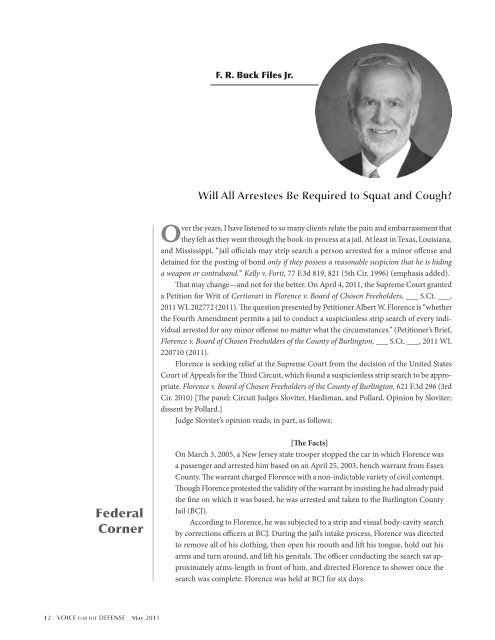for the defense for the defense - Voice For The Defense Online
for the defense for the defense - Voice For The Defense Online
for the defense for the defense - Voice For The Defense Online
Create successful ePaper yourself
Turn your PDF publications into a flip-book with our unique Google optimized e-Paper software.
F. R. Buck Files Jr.<br />
Over <strong>the</strong> years, I have listened to so many clients relate <strong>the</strong> pain and embarrassment that<br />
<strong>the</strong>y felt as <strong>the</strong>y went through <strong>the</strong> book-in process at a jail. At least in Texas, Louisiana,<br />
and Mississippi, “jail officials may strip search a person arrested <strong>for</strong> a minor offense and<br />
detained <strong>for</strong> <strong>the</strong> posting of bond only if <strong>the</strong>y possess a reasonable suspicion that he is hiding<br />
a weapon or contraband.” Kelly v. <strong>For</strong>ti, 77 F.3d 819, 821 (5th Cir. 1996) (emphasis added).<br />
That may change—and not <strong>for</strong> <strong>the</strong> better. On April 4, 2011, <strong>the</strong> Supreme Court granted<br />
a Petition <strong>for</strong> Writ of Certiorari in Florence v. Board of Chosen Freeholders, ___ S.Ct. ___,<br />
2011 WL 202772 (2011). <strong>The</strong> question presented by Petitioner Albert W. Florence is “whe<strong>the</strong>r<br />
<strong>the</strong> Fourth Amendment permits a jail to conduct a suspicionless strip search of every individual<br />
arrested <strong>for</strong> any minor offense no matter what <strong>the</strong> circumstances.” (Petitioner’s Brief,<br />
Florence v. Board of Chosen Freeholders of <strong>the</strong> County of Burlington, ___ S.Ct. ___, 2011 WL<br />
220710 (2011).<br />
Florence is seeking relief at <strong>the</strong> Supreme Court from <strong>the</strong> decision of <strong>the</strong> United States<br />
Court of Appeals <strong>for</strong> <strong>the</strong> Third Circuit, which found a suspicionless strip search to be appropriate.<br />
Florence v. Board of Chosen Freeholders of <strong>the</strong> County of Burlington, 621 F.3d 296 (3rd<br />
Cir. 2010) [<strong>The</strong> panel: Circuit Judges Sloviter, Hardiman, and Pollard. Opinion by Sloviter;<br />
dissent by Pollard.]<br />
Judge Sloviter’s opinion reads, in part, as follows:<br />
Federal<br />
Corner<br />
[<strong>The</strong> Facts]<br />
On March 3, 2005, a New Jersey state trooper stopped <strong>the</strong> car in which Florence was<br />
a passenger and arrested him based on an April 25, 2003, bench warrant from Essex<br />
County. <strong>The</strong> warrant charged Florence with a non-indictable variety of civil contempt.<br />
Though Florence protested <strong>the</strong> validity of <strong>the</strong> warrant by insisting he had already paid<br />
<strong>the</strong> fine on which it was based, he was arrested and taken to <strong>the</strong> Burlington County<br />
Jail (BCJ).<br />
According to Florence, he was subjected to a strip and visual body-cavity search<br />
by corrections officers at BCJ. During <strong>the</strong> jail’s intake process, Florence was directed<br />
to remove all of his clothing, <strong>the</strong>n open his mouth and lift his tongue, hold out his<br />
arms and turn around, and lift his genitals. <strong>The</strong> officer conducting <strong>the</strong> search sat approximately<br />
arms-length in front of him, and directed Florence to shower once <strong>the</strong><br />
search was complete. Florence was held at BCJ <strong>for</strong> six days.

















